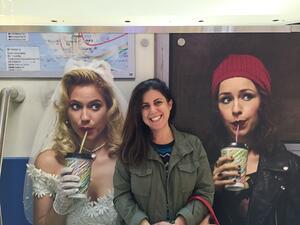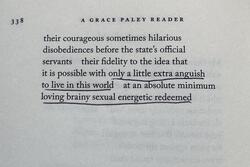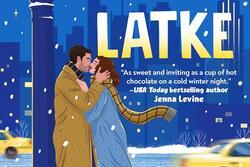An Interview with "Hindsight" Creator Emily Fox
If you still haven't watched Hindsight on VH1, it's time to get with the program. Built on the premise that forty-something Becca—about to marry her second husband—suddenly travels back in time to 1995, the show is at once a rolicking journey through 90s nostalgia and a thoughtful meditation on female friendship. I talked to Hindsight's creator and executive producer, Emily Fox, about developing the show, what it's like to be a woman writer in Hollywood, and the travails of finding Gillette Green Razors.
Time travel, the 90s, a broken friendship and running away at the altar . . . all of these elements seem so familiar on paper, but come across as fresh and fun in your show. How did the idea for develop, and how have you made these tried-and-true tropes your own?
We started developing the idea for Hindsight back in the summer of 2009. I was kicking around ideas for a pilot with producers Carl Beverly and Sarah Timberman, and in the process of musing about our lives and all the decisions that had led us to where we were, we started pondering the idea of life being a series of crossroads, and wondering what it would be like to go back to one of those forks in the road to choose the other path. We landed on the idea of a female character who found herself pretty far down a path that had turned out to be disappointing in many ways. The bookends of the two weddings grew up around her as we talked about big decisions she would have made (and regretted) in her life. Becca’s first marriage to Sean burned hot but flamed out; her second marriage, to Andy, was going to be a deliberately safe but boring choice. But the real love story we explore in the show is between Becca and her best friend Lolly. I had such strong, fond, life-defining memories of my female friendships in my twenties, and I wanted to explore the under-explored phenomenon of a friend breakup, which is so much more confusing and less codified than a romantic breakup.
We tried to make familiar situations (time travel, canceled weddings) feel distinct by shading the characters and giving everyone real flaws and idiosyncrasies. Lolly isn’t just a space case; Sean isn’t just a beefcake; Andy isn’t just a square. And Becca isn’t awash with regret or paralyzed with indecision. She's not lying in the gutter; her life hasn’t been this unmitigated disaster. She’s just a woman like any other who has made a series of decisions in her life that have led her down this path, and one day she looks around and says, this might not have been the way I would have gone if I could go back and do it all over again. She’s basically content, and there’s nothing material to complain about, but she’s lonely. It would seem to the naked eye that she has a nice life, but something big is missing. I think this is what makes her compelling: she’s relatable, but you also can’t put her into a box. Everyone knows someone like Becca. And everyone has pondered a “what if?” scenario.
As for the nostalgia factor, we didn’t initially set out to make a show about the 1990s. We really started with the character and built this story around her, and then did the math to figure out where she would land after falling down this time rabbit hole. Twenty years just felt clean and even, so we dropped her into the 90s… and then discovered that this was also the moment just before technology exploded and interconnectivity became something we took totally for granted. In some ways, the backdrop that has become so fundamental to the show was really sort of just a happy accident.
One of the most striking elements of Hindsight is its warm depiction of female friendship. What role did that theme play for you in creating the story? What are some of your favorite TV female friendships?
My female friendships totally shaped my twenties, and I desperately wanted to delve into that unique push-pull we all have with our female friends. Of course there’s so much support and love for each other. But there are also these little battles where someone feels judged or criticized or misunderstood, and you have to figure out a way to solve the problem without being passive-aggressive or just ignoring it. I loved the idea of really digging into that mess of emotions, the lawless society of female friendship where someone feels betrayed or misunderstood or judged, and then you have to go to brunch the next morning and deal with it.
Some of my favorite female friendships on TV date back to thirty-something, where Hope and Ellyn were these college friends who had taken two different paths: Hope had become a stay-at-home earth mama married to an ambitious ad exec, grappling with her fear that her domestic so-called bliss will eat her brain, while Ellyn was sort of an ur-Miranda Hobbes, the career girl with the great apartment who was nonetheless a bit lonely and felt totally left out of Hope’s warm little nursery idyll. They were like castaways on their rowboats looking at each other from across this choppy ocean, wishing desperately that they could be together, but knowing that they were drifting apart. Their respective decisions were “right” for them but they both had regrets and misgivings and secretly feared that the other one could no longer understand what they were going through. They were both so envious but also afraid of what the other one had. It was complex and interesting and I was really too young to understand it in my bones the way I do now, but I remember thinking, you are getting an education here, so pay attention. It was all very 1980s and now feels even a bit quaint, but the truth is that thirty-something birthed a generation of TV shows that is now its own genre. It paved the way for shows like Friday Night Lights, Brothers and Sisters, Party Of Five, Gilmore Girls. It was really groundbreaking in its way, and that friendship was drawn so realistically and beautifully. It was a beautiful mess and it just felt completely authentic, like you were a fly on the wall listening to a real conversation. I loved it.
Watching the show, I keep thinking about the contemporary debates on “having it all” and what women can/should expect from their 21st century lives. Do you intend the show to engage in this cultural conversation? What do you think Becca and Lolly can teach us about gender and fulfillment?
The beautiful part of going back to the 90s is that Lolly certainly isn’t thinking about gender and fulfillment. She’s just trying to drag herself out of bed and get herself to work every day. Lolly definitely has ambitions, but none of that pressure has come to bear yet. She’s only 23, so she’s in that no man’s land between college and “real life” where all you have to do is pay your rent and live on spaghetti. Becca, on the other hand, has run the gauntlet of the last 20 years, when women who were born in the 70s and raised in the 80s were sort of bait-and-switched. First we were told to work hard and pursue a dazzling career, and then somewhere along the way the terms changed and the mandate shifted, and the dazzling career suddenly wasn’t enough—you also had to have babies and be a wonderful mother and a great organic cook and a watchdog for the environment and a dynamic partner to our feminist husbands. Wait, what? The rules have been rewritten before Becca’s eyes, and she finds herself at the start of the pilot with this wretched sense of having been cheated and misled. She followed her heart and got burned; she lost her friend somewhere in the process; and her career never took off. So she’s left with this nagging sense of emptiness, wondering if the decisions she made along the way were just in response to these external societal pressures that have turned out to be false and fleeting and “trendy” and unfulfilling and—most annoyingly—impossible to achieve. Her failure to meet everyone else’s expectations is distilled down to its essence in this conversation she overhears between her mother and her cousin, who are lamenting the fact that Becca’s life never really seemed to take off. They both claim to be relieved that Becca is settling down. But all Becca hears is “settling.”
So now she has this chance to start over, and she senses deep down that the purpose of this journey is to learn to trust her gut. But she’s still the girl who needs the gold star and who has a keen sense of right and wrong, and that doesn’t really change. So one of her main struggles throughout the series is figuring out how to trust her instincts and take full advantage of this bizarre opportunity while still doing the “right” thing and figuring out which direction her moral compass is pointing. It’ll be very interesting when she gets to a place where her decisions start to solidify and take shape, and what kind of woman she decides to be, knowing that she didn’t much like the kind of woman she became in her first life, and knowing that the things that were supposed to make her feel fulfilled left her feeling empty instead. I’d love for her to avoid those traps and roadblocks this time around. I’m interested to see if she has the emotional strength and agility to do that.
90s nostalgia is so huge right now, and Hindsight does a particularly amazing job of nailing decade-appropriate fashion and music in every episode. What’s the process of deciding on those important details?
It is unbelievably painstaking, but we have the benefit of some real wizardry on our crew: our costumer, our production designer, our prop master, and our music supervisor and their respective departments have brought to life all of my memories of that time period. We used for inspiration all the photo albums and cassette tape mixes and what my fashionable cousins call my “deep space archives” which are plastic bins stuffed with my old clothes from the 80s and 90s which I cannot bear to give away. We really wanted the look of the show to be authentic without seeming too tongue-in-cheek or over the top. We wanted everyone to be dressed exactly as they would have been, and we didn’t want it to look like we were making fun of those styles. They were really cute at the time, and we loved them, and we wanted to give our modern day viewers a little nostalgic chuckle without taking them out of the story with an absurd take on the look. So our wardrobe head went and plucked all the authentic flower dresses and striped sweaters out of some box in a warehouse where they sell clothes by the pound. We insisted on the real thing since the proportions of today’s facsimiles are not quite right (i.e., the contemporary stuff you might find at department stores as part of a cute “90s revival” is just downright too flattering). And our production designer and prop master found all the artifacts of our youth—the Mac Classics, the right televisions, the right phones. It was a fun scavenger hunt. You can find everything on eBay. The world is full of garages and moms who clean them out and sell everything.
We looked to Mad Men as our model for how to do a period piece without bashing people over the head with it—we want audiences to notice these little period details without being distracted by them. We want to get the laugh, but we don’t want to shine a light on the joke. It’s meant to be subtle. Becca gives us our eyes and ears on the time period, so through her we get the objective point of view—like when she finds her old green Gillette razor. It’s just a tiny moment, but we all had that razor. This seemingly benign, small, inconsequential artifact can bring memories rushing back. And suddenly it’s not inconsequential at all, but this symbol of lost youth. And thank goodness for Google Image because all I had to do was search for “Gillette Green Razor” and then I showed the picture to the prop master and voila, there’s the razor on the set. It’s like magic.
Can you tell us a bit about your career leading up to Hindsight? What has your experience been like as a woman writer in Hollywood?
Like many young people just out of college, I came to LA to take an assistant job. Working as an assistant in the entertainment business is like our version of graduate school; you learn everything you need to know about the business while sitting at a desk, rolling phone calls, listening in, reading drafts of screenplays, doing coverage, and setting up meetings. It gives you the lay of the land.
I was working for a literary agent when I had the “ah-ha” moment that I wanted to write movies. I’d always wanted to be a writer of some kind, but it took me a while to gather up the courage to try screenwriting. I started working on features in the late 90s and then segued into writing for television in about 2004. That was when the tide started to turn, and television started to be the vibrant place it is now. More networks were starting to crop up in the wake of HBO’s new original programming, and the writer is really valued and included in the process, which had not always been the case in features. Man or woman, the writer is very near or at the top of the chain in television.
Over the years, I wrote on staff for a couple of TV dramas, but I always had the most fun writing pilots. You really get to create a world and a huge mess of problems, and it’s fun to do that. I love crafting all the puzzle pieces and then tossing them on the floor and saying, “okay, in series we will put all of these together.” I wrote Hindsight in 2009 for another network, and they liked it but passed on it. I was heartbroken, but you can’t let yourself get too sad about a pilot. The odds are stacked against you from the start, so you have to develop a thick skin. I went off and had my second baby and worked on another show and kind of made myself forget all about Hindsight. Then a year and a half later VH1 got the script and declared that this was right in their sweet spot and that they wanted to redevelop it and put it on their network as part of their foray into scripted programming. We couldn’t have been luckier to have ended up at this network, where they really care about the music and the nostalgia but where they have also encouraged us to tell the stories we want to tell. It’s fun to be pioneers on a network that isn’t necessarily known for its scripted programming. I like that we have surprised people with the depth of our show’s characters and stories. All of our network executives are women and two of our executive producers are women, so it’s never felt like a boys’ club. I’ve felt very valued as a female showrunner and I’m delighted to have a co-showrunner who’s a guy. It’s a very harmonious partnership and it gives us all points of view in the writers’ room as we develop stories and on the set as we try to manage the three ring circus of production.
As for being a woman in Hollywood, I truly think this is a golden age to be a woman working in television. Yes, I want things to be better and I want there to be more female directors and more female executives and more female writers, and I want the change to be less gradual. But I do feel like the women I know who are working in the television writing business are generally very happy. It’s creative, it’s dynamic, you often get to see your work on one screen or another, and your parents are usually pretty excited because you have a cool job that they can brag about to their friends. I have a husband and two kids, and apart from when I am deep in production, I feel like I get to see them a lot, which is nice; I can basically be the kind of mother I want to be, although I am nowhere near to achieving the mythical Pinterest ideal and I definitely cannot cook (organic or otherwise). It’s always a struggle to find perfect balance, but it’s a lot easier to strive for balance when you love what you do.
Are you a Becca or a Lolly?
I’m a Lolly, although I never owned Doc Martens and I rarely skipped work just for the heck of it. Lolly has a lot of common sense and a lot of wisdom. I have a longer attention span than she does.







Please message Emily Fox and ask her to bring back Hindsight!